|
|
|
Sort Order |
|
|
|
Items / Page
|
|
|
|
|
|
|
| Srl | Item |
| 1 |
ID:
069097
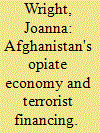

|
|
|
| 2 |
ID:
108058
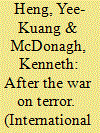

|
|
|
|
|
| Publication |
2011.
|
| Summary/Abstract |
In March 2009, the Obama administration sent a message to senior Pentagon staff instructing them to refrain from using either of the terms 'Long War' or 'Global War on Terror' and to replace these terms with 'Overseas Contingency Operations'. The change in tone and, potentially, substance, from the Obama White House by ending the 'war on terror' at the rhetorical level suggests a need to shift our academic attention towards developing more appropriate analytical frameworks for examining alternative strategies for countering terrorism. This paper seeks to explore what it terms an emerging risk-based approach being deployed by states. Our framework proposed here deploys the twin concepts of 'risk bureaucracies' and risk regulatory regimes (RRRs) in examining terrorist financing and aviation security regulations.
|
|
|
|
|
|
|
|
|
|
|
|
|
|
|
|
| 3 |
ID:
178676


|
|
|
|
|
| Summary/Abstract |
The innovation terrorist groups apply to their strategy and tactical operations is subject to increasing study. Yet an assessment of the innovation applied by terrorist groups to their financing is lacking, with consideration typically limited to “where does the money come from and what is it used for?” The forces that determine how terrorist groups fund themselves are questioned less closely. Given the widely held belief by national governments and international organizations that financing is a key requisite of terrorist activity, this omission represents a striking gap in our ability to anticipate, disrupt, and deny terrorists of financing.
|
|
|
|
|
|
|
|
|
|
|
|
|
|
|
|
| 4 |
ID:
097179
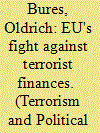

|
|
|
|
|
| Publication |
2010.
|
| Summary/Abstract |
This article offers an analysis of the European Union's (EU) efforts in the fight against terrorist finances. Following the 9/11 attacks, the EU has adopted the relevant United Nations counterterrorism resolutions as well as the special recommendations of Financial Action Task Force. In addition, the EU has developed its own measures spanning across all of its three pillars. There is, however, a cause for concern that some of these measures have not been properly implemented, while others have been criticized on legal, transparency, legitimacy, and efficiency grounds. These shortcomings are not only due to EU's own internal obstacles, but also result from the EU's uncritical adoption of the prevailing smart sanctions and money-laundering regimes, which are based on a number of unwarranted assumptions that do not reflect the nature of contemporary terrorist threats in Europe.
|
|
|
|
|
|
|
|
|
|
|
|
|
|
|
|
| 5 |
ID:
076145


|
|
|
| 6 |
ID:
074297


|
|
|
|
|
| Publication |
Washington, DC, Center for Transatlantic Relations, 2005.
|
| Description |
xii, 126p.
|
| Standard Number |
0976643405
|
|
|
|
|
|
|
|
|
|
|
|
Copies: C:1/I:0,R:0,Q:0
Circulation
| Accession# | Call# | Current Location | Status | Policy | Location |
| 051805 | 363.3256/RIC 051805 | Main | On Shelf | General | |
|
|
|
|
| 7 |
ID:
051145


|
|
|
|
|
| Publication |
Paris, Financial Action Task Force on Money Laundering, 2004.
|
| Description |
129p.
|
| Standard Number |
9264106103
|
|
|
|
|
|
|
|
|
|
|
|
Copies: C:1/I:0,R:0,Q:0
Circulation
| Accession# | Call# | Current Location | Status | Policy | Location |
| 048205 | 303.625/FAT 048205 | Main | On Shelf | General | |
|
|
|
|
| 8 |
ID:
076663


|
|
|
| 9 |
ID:
071972


|
|
|
|
|
| Publication |
2006.
|
| Summary/Abstract |
Attempts to disrupt the flow of funds through Africa used to finance terrorism have been hindered by terrorists utilizing satellite telecommunications in conjunction with hawala, an ancient system of fund transfers based on trust. This arrangement leaves few records for tracing transactions, a task made even more difficult by the general paucity of investigators trained in the languages commonly used for hawala. Acquiring personnel with the appropriate linguistic skills is one of the steps agencies can take to reduce the terrorist financing that occurs through this unique blend of an ancient system with modern technology.
|
|
|
|
|
|
|
|
|
|
|
|
|
|
|
|
| 10 |
ID:
099891
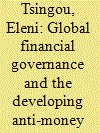

|
|
|
|
|
| Publication |
2010.
|
| Summary/Abstract |
The developing anti-money laundering (AML) regime exhibits a specific, non-financial set of policy preoccupations. Yet it is important to examine AML from a global financial governance perspective as the regime essentially imposes controls on the movement of money. This article analyses the political, institutional and regulatory evolution of the regime and argues that it serves to address a need for action on a diverse set of public policy goals (corruption, drug trafficking or terrorism); to relieve financial centres in advanced economies from offshore competitive pressures; and, unintentionally, to shape private sector practices so as to consolidate the position of key market institutions. The article stresses that the achievements with respect to its goals remain modest at best in relation to its ambitions, while important side-effects raise concerns about its role, efficiency and legitimacy. It also examines the possibility that AML has been tacitly accepted as the price for capital mobility.
|
|
|
|
|
|
|
|
|
|
|
|
|
|
|
|
| 11 |
ID:
051647


|
|
|
|
|
| Publication |
May-Jun 2004.
|
| Summary/Abstract |
On 24 September 2001, President Bush announced the first stage of the War on Terrorism with an attack against the terrorist financial infrastructure. Since then, the impact of this attack on Al Qaeda's ability to operate has been minimal, for three reasons. First, Al Qaeda has built a strong network of financiers and operatives who are both frugally minded and business savvy. As a result, terrorist finances are often hidden in legitimate and illegitimate businesses and disguised as commodities and cash. Second, Al Qaeda has learned to effectively leverage the global financial system of capital markets. Small financial transfers, underregulated Islamic banking networks and informal transfer systems throughout the world make it almost impossible to stop Al Qaeda from moving money. Third, Al Qaeda has built a significant base of Islamic charities in Saudi Arabia with international divisions that have not been scrutinized or controlled by the regime. As a result, Al Qaeda's sophisticated financial network may be able to sustain international efforts to disrupt it. Financial regulations imposed to reduce terrorist financing must be applied more broadly and be supported by significant resources. An improvement in the war on terrorist financing requires better international coordination, more effective use of financial regulations, and regulating the Saudi Arabian charity structure.
|
|
|
|
|
|
|
|
|
|
|
|
|
|
|
|
| 12 |
ID:
156908
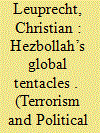

|
|
|
|
|
| Summary/Abstract |
That terrorists, criminals, and their facilitators exploit the global marketplace is well known. While the global movement of illicit goods is well documented, robust empirical evidence linking terrorism and organized crime remains elusive. This article posits Network Science as a means of making these links more apparent. As a critical case study, Hezbollah is quite possibly the most mature globalized terrorist organization, although it thinks of itself as the “Party of God.” However, the means seem to justify the ends: this article shows that Hezbollah’s holy men have no qualms about resorting to pornography, contraband cigarettes, immigration fraud, and credit card fraud to raise funds. Beyond establishing links, Social Network Analysis reveals other important characteristics, such as the relative autonomy from Hezbollah headquarters that local fundraising networks enjoy. That finding implies a paradigm shift: Hezbollah is no less a terrorist organization than an organized crime syndicate. This is apparent in a network’s structure. Transnational Organized Crime is typically about nodes being connected to many others in the network. Yet, Hezbollah fundraising networks allow such connectivity because of the group’s typically high levels of mutual trust and familial relationships. This creates a vulnerability that can be exploited by law enforcement and intelligence organizations.
|
|
|
|
|
|
|
|
|
|
|
|
|
|
|
|
| 13 |
ID:
099511


|
|
|
|
|
| Publication |
2010.
|
| Summary/Abstract |
The following article examines how the principles of coercion theory can be applied towards the formulation of strategy aimed at countering terrorist financing. In doing so, this article provides a breakdown of coercion's relevant theoretical concepts on the subject matter. This is followed by an elaboration of the specific coercive approaches-non-military and military-that can be implemented to counter terrorist finance operations, along with an illustration, based on case-evidence, of how these approaches can be practically employed with power and policy mechanisms at the state and international levels. The article concludes with a discussion on what is required, from a coercion stand-point, to successfully counter a terrorist organization's financial operations, as well as the advantages and limitations involved in such a strategy.
|
|
|
|
|
|
|
|
|
|
|
|
|
|
|
|
| 14 |
ID:
115356
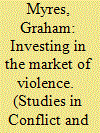

|
|
|
|
|
| Publication |
2012.
|
| Summary/Abstract |
Terrorist financing is the dedicated pursuit of adequate capitalization within a market of violence, wherein terrorist organizations seek to extract resources and funding from the social, political, and economic environment in which they operate. At the same time, the effectiveness of a terrorist group in this pursuit is highly dependent on their organizational type and design, its leadership capabilities, and its capacity for organizational learning-factors that shape the ability of terrorist groups to identify and exploit a limited set of investment and rent-seeking opportunities.
|
|
|
|
|
|
|
|
|
|
|
|
|
|
|
|
| 15 |
ID:
190982
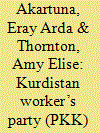

|
|
|
|
|
| Summary/Abstract |
Overseas diasporas have long been exploited by terrorist organisations seeking funding and support from areas beyond their operation. The Kurdistan Worker’s Party (PKK), active in south-eastern Turkey, is no exception and maintains a significant international presence. This paper uses seventy-three survey responses and thirteen interviews amongst London’s Turkish and Kurdish diaspora to provide an original and comprehensive insight into the PKK’s overseas operations, including their offending patterns, methods, hotspots, offender/victim profiles and existing countermeasures. Respondents were also consulted on new community-based prevention measures designed to address limited law enforcement responses and the laissez-faire approaches of diaspora host countries. This strategy, which combines crime science and behavioural economic theories, consists of Clarke’s “Situational Crime Prevention” theory and Thaler and Sunstein’s “Nudge” theory (SCP+N). The results indicate that the PKK creates criminal opportunities by “legitimising” itself across diasporas by invoking ideological sympathy and social dependence (conceptualised as “constructed legitimisers”), ensuring minimal resistance to its activities. SCP+N is motivated as an effective counterstrategy, addressing both the rational and impulsive nature of offending. The overall theoretical contribution of this paper is to assess overseas terrorist financing through a prevention-oriented, situational and behavioural framework, and to propose a community-based strategy to effectively counter such activities.
|
|
|
|
|
|
|
|
|
|
|
|
|
|
|
|
| 16 |
ID:
076599
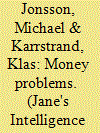

|
|
|
| 17 |
ID:
076598


|
|
|
| 18 |
ID:
022886


|
|
|
|
|
| Publication |
2002.
|
| Description |
293-305
|
|
|
|
|
|
|
|
|
|
|
|
|
|
|
|
| 19 |
ID:
188915
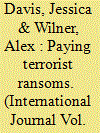

|
|
|
|
|
| Summary/Abstract |
Terrorist groups are believed to be financed, in part, by ransoms paid for kidnap victims. As part of global efforts to counter the financing of terrorism and prevent further terrorist attacks (including more kidnappings), the international community has attempted to implement a moratorium on the payment of ransoms. Despite a unified stance, ransom payments to terrorist groups have continued. An exploratory review of 20 countries reveals significant variation between public statements and private practice when it comes to ransom payments. While it is clear that states, organizations, and individuals are paying terrorist ransoms, it is far less clear what effect this has had on terrorism itself. A review of three case studies shows significant variation in the relationship (or perhaps, lack thereof) between ransom payments and terrorist attacks. These findings suggest a need for more study on the effects of ransom payments on terrorist capabilities, and a re-assessment of existing “no-ransom” policies.
|
|
|
|
|
|
|
|
|
|
|
|
|
|
|
|
| 20 |
ID:
091308


|
|
|
|
|
| Publication |
Washington, DC, World Bank, 2009.
|
| Description |
xxvii, 271p.
|
| Standard Number |
9780821379127
|
|
|
|
|
|
|
|
|
|
|
|
Copies: C:1/I:0,R:0,Q:0
Circulation
| Accession# | Call# | Current Location | Status | Policy | Location |
| 054399 | 364.168/CHA 054399 | Main | On Shelf | General | |
|
|
|
|
|
|
|
|
|